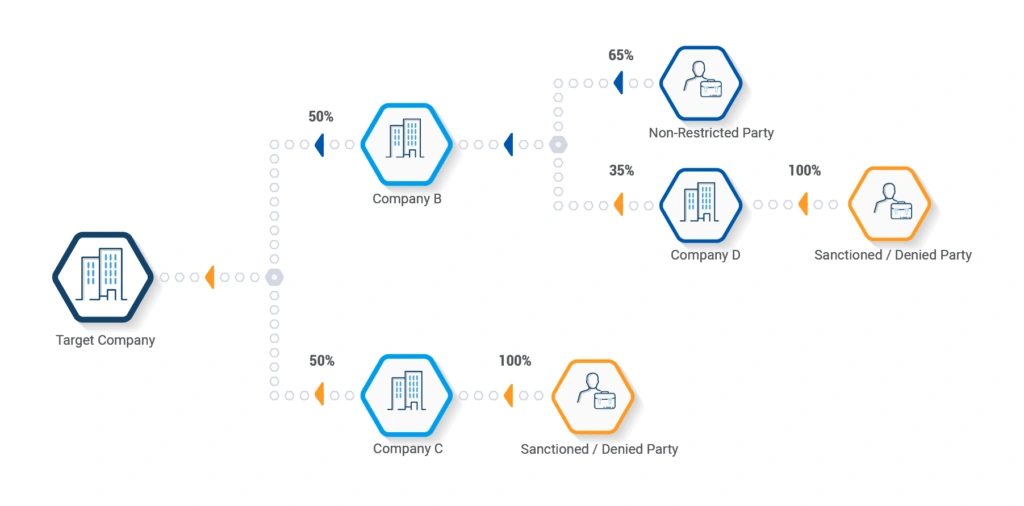Written by Jackson Wood, Director, Industry Solutions, Trade Compliance, Descartes
A new round of Russia sanctions by the U.S. and others has expanded the industries and entities facing trade restrictions and export controls.

Figure 1: The U.S., EU, and UK supporting Ukraine by instituting new sanctions against Russia.
The Russia-Ukraine conflict recently passed its two-year anniversary, which began when Russia launched its attack on February 24, 2022. Since then, world governments, including the U.S., EU, UK, and UN, have imposed the most far-reaching and aggressive sanctions in the history of trade controls.
Recently, roughly a week before the second anniversary, anti-corruption activist Aleksey Navalny died in an Arctic prison. The United States and European Union both responded with additional sanctions targeting parties believed to have ties to human rights abuses, sanctions evasion, and Russia’s military-industrial complex.
This new round of sanctions has expanded the industries and entities subject to Russian sanctions. Organizations across many industries will need to adopt the right strategies, tools, and processes to remain compliant.
Key Takeaways
- Russia’s potential involvement in the death of Aleksey Navalny has resulted in a new round of sanctions from the U.S. and EU.
- The Russia-Ukraine conflict has reached its second anniversary, further prompting additional sanctions targeting Russia’s military manufacturing capabilities.
- The United States has imposed approximately 500 new sanctions, while the EU has imposed roughly 200 new sanctions.
- The expanding scope and volume of sanctions will significantly impact many industries — organizations must adopt the right strategies to remain compliant.
- The U.S. warns businesses to be on alert for sanctions evaders and provides details on what to look out for.
The Evolution of Russia Sanctions
There are now 16,587 Russia sanctions, including state-owned organizations, oligarchs, and institutions. Entities in other countries suspected of aiding in sanction evasion have also been targeted. While some sanctions were in effect before the Ukraine-Russia conflict, the vast majority of sanctions were imposed after the invasion.
The first round of conflict-related sanctions rolled out shortly after the initial invasion. We’ve since seen that sanctions have continually evolved as the conflict continued, with the U.S., EU, and UK leading the charge. Taiwan, the Czech Republic, Canada, and Australia have also imposed their sanctions to disrupt Russia’s ability to fund the conflict.
The landscape for staying compliant with export controls has rapidly become complex yet unavoidable. Inadvertently transacting with denied parties can result in steep fines and other penalties for businesses. Recently, an entirely new round of sanctions has been enacted in response to Navalny’s death and the ongoing aggression against Ukraine.
The U.S. New Restrictive Measures Against Russia
The United States Department of Treasury and State imposed approximately 500 new sanctions in response to Navalny’s death and the ongoing invasion. This new round of sanctions largely targets the finance and defense sectors, creating an even greater need for Russia sanctions screening.
The state-owned National Payment Card System Joint Stock Company (NSPK) plays a vital role in facilitating financial transactions internally and internationally. The new Department of Treasury sanctions target NSPK, nine regional financial institutions, five investment and venture capital funds, and six financial technology companies.
Additionally, several entities with connections to Russia’s military-industrial bases and related sectors have been targeted in an attempt to disrupt and degrade the country’s ability to manufacture new equipment. Sanctions target hundreds of organizations in the following sectors to meet this goal:
1. Additive manufacturing
2. CNC machines and other metalworking equipment
3. Robotics
4. Semiconductors
5. Lubricants and coolants
6. Weapons production
7. Optics
8. Navigational equipment
9. Unmanned aerial vehicles and parts
10. Energy storage and power supplies
11. Industrial automation, including software
You can see the specific sanctioned entities in the annexes of the press release. Due to the breadth of industries targeted, many companies outside Russia may need to begin or advance their global sanctions screening processes. According to customs and trade data, sanctioned companies in drone manufacturing have been importing American and European-made electronics including data processing machines and antennae parts which are subject to export control restrictions imposed by the U.S., EU, UK, and Japan.
The U.S. Department of Commerce’s Bureau of Industry and Security (BIS), added 93 entities to its Entity List for supporting Russia’s war effort, and updated its high-priority items list with stringent export controls by including the HS codes of 50 common items Russia seeks for its weapons programs.
The U.S. Department of State has also introduced sanctions targeting those involved in Aleksey Navalnay’s death. These sanctions focus on the deputy director and other officials of the Federal Penitentiary Service of Russia.
Other sanctions from the Department of State focus on Russia’s future energy production and exports. Several entities involved in liquified natural gas and transportation tankers have been designated as denied parties.
The EU’s 13th Package of Individual and Economic Sanctions
Similar to the U.S., the European Union Council adopted a new set of import-export controls as well as sanctions on over 200 organizations and individuals. Total EU sanctions now exceed 2,000 listings. According to the press release, the EU’s new measures aim to achieve the following goals:
- Target Russia’s military and defense sector, including over 140 companies and individuals, with the focus on disrupting the country’s ability to manufacture high-tech military equipment.
- Sanction 10 companies involved in the shipping of goods from the Democratic People’s Republic of Korea to Russia and Belarusian companies and individuals providing support to Russia.
- Fight sanction evasion by targeting a Russian logistics company and its director involved in circumventing sanctions to import goods to Russia.
- Take direct action against Russia’s temporary occupation of Ukraine areas, sanctioning six judges and ten officials in these territories.
- Target 15 individuals and two entities involved in the forced transfer and deportment of Ukrainian children.
The EU’s aims are to diminish Russia’s ability to continue to manufacture military equipment, fund the war, and evade existing sanctions. The EU’s sanctions demonstrate the global coordination and broad scope of the efforts to prevent Russia from being able to continue the conflict.
The Impact of These Expanding Global Sanctions on Business
Businesses worldwide must comply with Russian sanctions or risk fines and penalties, possibly jeopardizing their ability to operate. While not as expansive as the EU and U.S., the UK also announced more than 50 new sanctions and similarly the Canadian government imposed new restrictions on 10 individuals and 153 entities under its Special Economic Measures (Russia Regulations).
These latest rounds of sanctions have further complicated denied party screening by introducing new entities and individuals that must be identified. Part of this new round of sanctions from the U.S., EU, UK, and other bodies are targeting evasion tactics used by Russia and its supporters. Sanctioned parties have several strategies for circumventing the restrictions placed on them. This further complicates the ability of companies under U.S./EU jurisdiction to operate confidently because if these evasion tactics are successful, any unwitting person or business that transacts with these denied parties will be subject to fines and penalties.
It is important to note that in addition to the organizations and individuals newly added to the Russian sanctions lists, there are hundreds of entities which do not appear on denied parties lists but are owned or controlled, directly or indirectly, by these sanctioned / denied parties and are considered restricted under the “OFAC 50% rule”.

Figure 2: Complex multi-level ownership structures to evade Russia sanctions complicates compliance.
Going forward, organizations should be vigilant and employ heightened denied party screening measures to mitigate third-party risk. A document from the Department of Treasury details the topologies of sanctions evasion that organizations must be aware of:
- Using family members and close associates to maintain access and control.
- Using real estate to hold value and benefit from its wealth.
- Leveraging complex ownership structures to avoid identification.
- Using expertise and enablers to avoid direct involvement.
- Falsifying trade information to facilitate shipments to Russia from third-party jurisdictions.
The same document details several strategies for organizations to abide by in order to avoid being exploited by sanction evaders. A running theme throughout many of the provided suggestions is developing robust global sanctions compliance processes, adopting effective technologies, and evolving risk mitigation techniques.
Failing to comply with sanctions can result in steep penalties. In 2023, the total civil penalties from the Office of Foreign Assets Control was $1,541,380,594 — and that does not include any criminal penalties or fines from other countries. Organizations can expect to see a rise in enforcement actions stemming from these Russia sanctions. Recently, U.S. senate lawmakers called on the Biden Administration to increase funding for (BIS) to strengthen its export controls and enforcement capabilities.
The new U.S. sanctions also focus on a broad range of industries related to Russia’s military-industrial capabilities. As such, any business within these industries must take on new responsibilities to ensure they remain fully compliant.
Companies must be aware of any sanction violations throughout their supply chain. Inadvertently violating sanctions won’t free you from fines and penalties — it’s critical to have the right tools and software in place to remain compliant.
How Descartes Can Help You Mitigate Russia Sanction Risks
The imposition of Russian sanctions on a broad range of industries and entities has expanded the breadth of Russian-related denied parties that organizations must be aware of. Businesses involved with electronics, metalwork, dual use goods and any of the 50 items added to the BIS high priority list are particularly at risk. They need to ensure they fully comply with these sanctions.
So how can you ensure your organization is fully compliant with current and future sanctions that may target your business? Here are a few tips to help your organization remain agile and have the right tools to ensure sanctions compliance:
- Create processes that continuously screen partners, clients, suppliers, and other third parties against denied parties screening lists. A process should also be enacted that details when a new partner or client should be screened.
- Adopt the right tools and systems that ensure efficiency and accurate screening to avoid overloading compliance teams with error-prone manual processes.
- Develop strategies for staying aware of any new sanctions that may emerge and be ready to update processes as necessary.
- Partner with a denied party screening solutions provider who has demonstrated the expertise to support your export compliance journey through volatile times
- Embed Comprehensive risk management processes that go beyond ad-hoc screening and incorporate automated sanctions compliance activities into the organization’s broad risk mitigation procedures.
- Create a framework of collaborative due diligence that involves compliance, operations, and legal teams to ensure actions taken are properly documented and meet all regulatory requirements.
The current sanctions landscape is highly dynamic, with new measures being introduced as the Russia-Ukraine conflict continues. Even beyond Russian sanctions, the same global strategies may be used again in the future — developing the right processes to remain in compliance is critical.
Descartes offers a continually updated Russia-Ukraine resource center alongside our leading-edge solutions to screen against denied parties. We leverage continuously updated sanction lists and automation so you can have confidence in your entire supply chain, clients, and customers.
Our platform leverages our business intelligence capabilities to rapidly screen new and existing partners, clients, or customers against known denied parties. New sanctions are constantly emerging — our data sets are updated in near real time to help businesses maintain continuous compliance and avoid costly consequences.
Is it time to strengthen your compliance program? Talk to a sanctions and denied party screening expert today to discover how our platform is designed to secure your business. Additionally, you can learn more about how Visual Compliance supports OFAC screening and helps you effectively identify sanctioned party ownership to prevent violations.
Also read what our customers are saying about us on G2 and see why we are ranked as the top denied party screening software solution.


